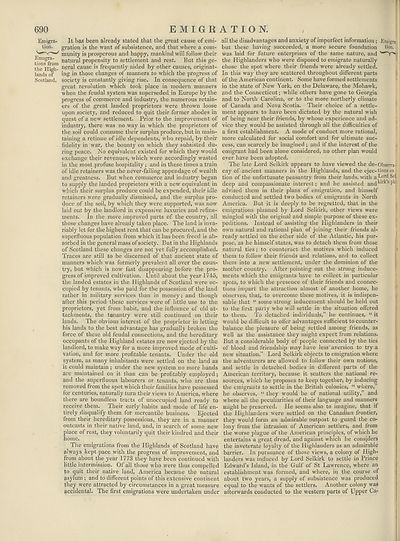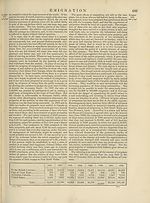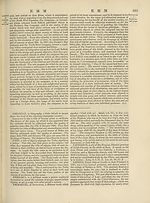Encyclopaedia Britannica > Volume 8, DIA-England
(700) Page 690
Download files
Complete book:
Individual page:
Thumbnail gallery: Grid view | List view

I
C>90 EMIGRATION.
Emigra- It has been already stated that the great cause of emi-
tion. gration is the want of subsistence, and that where a com-
munity is prosperous and happy, mankind will follow their
tions’from Inatura^ Propensity to settlement and rest. But this ge-
the High- neral cause is frequently aided by other causes, originat-
lands of hig in those changes of manners to which the progress of
Scotland, society is constantly giving rise. In consequence of that
great revolution which took place in modern manners
when the feudal system was superseded in Europe by the
progress of commerce and industry, the numerous retain¬
ers of the great landed proprietors were thrown loose
upon society, and reduced to quit their former abodes in
quest of a new settlement. Prior to the improvement of
industry, there was no way in which the proprietors of
the soil could consume their surplus produce, but in main¬
taining a retinue of idle dependents, who repaid, by their
fidelity in war, the bounty on which they subsisted du¬
ring peace. No equivalent existed for which they would
exchange their revenues, which were accordingly wasted
in the most profuse hospitality; and in these times a train
of idle retainers was the never-failing appendage of wealth
and greatness. But when commerce and industry began
to supply the landed proprietors with a new equivalent in
which their surplus produce could be expended, their idle
retainers were gradually dismissed, and the surplus pro¬
duce of the soil, by which they were supported, was now
laid out by the landlord in expensive luxuries and refine¬
ments. In the more improved parts of the country, all
those changes have already taken place. The land is inva¬
riably let for the highest rent that can be procured, and the
superfluous population from which it has been freed is ab¬
sorbed in the general mass of society. But in the Highlands
of Scotland these changes are not yet fully accomplished.
Traces are still to be discerned of that ancient state of
manners which was formerly prevalent all over the coun¬
try, but which is now fast disappearing before the pro¬
gress of improved cultivation. Until about the year 1745,
the landed estates in the Highlands of Scotland wrere oc¬
cupied by tenants, who paid for the possession of the land
rather in military services than in money; and though
after this period these services were of little use to the
proprietors, yet from habit, and the influence of old at¬
tachments, the tenantry were still continued on their
lands. The obvious interest of the proprietor in letting
his lands to the best advantage has gradually broken the
force of these old feudal connections, and the hereditary
occupants of the Highland estates are now ejected by the
landlord, to make way for a more improved mode of culti¬
vation, and for more profitable tenants. Under the old
system, as many inhabitants were settled on the land as
it could maintain; under the new system no more hands
are maintained on it than can be profitably einployed;
and the superfluous labourers or tenants, who are thus
removed from the spot which their families have possessed
for centuries, naturally turn their views to America, where
there are boundless tracts of unoccupied land ready to
receive them. Their early habits and mode of life en¬
tirely disqualify them for mercantile business. Ejected
from their hereditary possessions, they are in a manner
outcasts in their native land, and, in search of some new
place of rest, they voluntarily quit their kindred and their
home.
The emigrations from the Highlands of Scotland have
always kept pace with the progress of improvement, and
from about the year 1773 they have been continued with
little intermission. Of all those who were thus compelled
to quit their native land, America became the natural
asylum ; and to different points of this extensive continent
they were attracted by circumstances in a great measure
accidental. The first emigrations were undertaken under
all the disadvantages and anxiety of imperfect information ; Emigra
but these having succeeded, a more secure foundation don.
was laid for future enterprises of the same nature, and
the Highlanders who were disposed to emigrate naturally
chose the spot where their friends were already settled.
In this way they are scattered throughout different parts
of the American continent. Some have formed settlements
in the state of New York, on the Delaware, the Mohawk,
and the Connecticut; while others have gone to Georgia
and to North Carolina, or to the more northerly climate
of Canada and Nova Scotia. Their choice of a settle¬
ment appears to have been dictated by the natural wish
of being near their friends, by whose experience and ad¬
vice they would be assisted through all the difficulties of
a first establishment. A mode of conduct more rational,
more calculated for social comfort and for ultimate suc¬
cess, can scarcely be imagined; and if the interest of the
emigrant had been alone considered, no other plan would
ever have been adopted.
The late Lord Selkirk appears to have viewed the de-Obsem.
cay of ancient manners in the Highlands, and the ejec-tionson
tion of the unfortunate peasantry from their lands, with af;or^
deep and compassionate interest; and he assisted ands
advised them in their plans of emigration, and himself
conducted and settled two bodies of emigrants in North
America. But it is deeply to be regretted, that in the
emigrations planned by Lord Selkirk, other views were
mingled with the original and simple purpose of these ex¬
peditions. Instead of assisting the Highlanders in their
own natural and rational plan of joining their friends al¬
ready settled on the other side of the Atlantic, his pur¬
pose, as he himself states, was to detach them from those
natural ties; to counteract the motives which induced
them to follow their friends and relations, and to collect
them into a new settlement, under the dominion of the
mother country. After pointing out the strong induce¬
ments which the emigrants have to collect in particular
spots, to which the presence of their friends and connec¬
tions impart the attraction almost of another home, he
observes, that, to overcome these motives, it is indispen¬
sable that “ some strong inducement should be held out
to the first party who will settle in the situation offered
to them. To detached individuals,” he continues, “ it
would be difficult to offer advantages sufficient to counter¬
balance the pleasure of being settled among friends, as
well as the assistance they might expect from relations.
But a considerable body of people connected by the ties
of blood and friendship may have less'aversion to try a
new situation.” Lord Selkirk objects to emigration where
the adventurers are allowed to follow their own notions,
and settle in detached bodies in different parts of the
American territory, because it scatters the national re¬
sources, which he proposes to keep together, by inducing
the emigrants to settle in the British colonies, “ where,”
he observes, “ they would be of national utility,” and
where all the peculiarities of their language and manners
might be preserved. He seems also to imagine, that if
the Highlanders were settled on the Canadian frontier,
they would form an admirable outpost to guard the co¬
lony from the intrusion of American settlers, and from
the worse plague of the American principles, of which he
entertains a great dread, and against which he considers
the inveterate loyalty of the Highlanders as an admirable
barrier. In pursuance of those views, a colony of High¬
landers was induced by Lord Selkirk to settle in Prince
Edward’s Island, in the Gulf of St Lawrence, where an
establishment was formed, and where, in the course of
about two years, a supply of subsistence was produced
equal to the wants of the settlers. Another colony was
afterwards conducted to the western parts of JJpper Ca-
C>90 EMIGRATION.
Emigra- It has been already stated that the great cause of emi-
tion. gration is the want of subsistence, and that where a com-
munity is prosperous and happy, mankind will follow their
tions’from Inatura^ Propensity to settlement and rest. But this ge-
the High- neral cause is frequently aided by other causes, originat-
lands of hig in those changes of manners to which the progress of
Scotland, society is constantly giving rise. In consequence of that
great revolution which took place in modern manners
when the feudal system was superseded in Europe by the
progress of commerce and industry, the numerous retain¬
ers of the great landed proprietors were thrown loose
upon society, and reduced to quit their former abodes in
quest of a new settlement. Prior to the improvement of
industry, there was no way in which the proprietors of
the soil could consume their surplus produce, but in main¬
taining a retinue of idle dependents, who repaid, by their
fidelity in war, the bounty on which they subsisted du¬
ring peace. No equivalent existed for which they would
exchange their revenues, which were accordingly wasted
in the most profuse hospitality; and in these times a train
of idle retainers was the never-failing appendage of wealth
and greatness. But when commerce and industry began
to supply the landed proprietors with a new equivalent in
which their surplus produce could be expended, their idle
retainers were gradually dismissed, and the surplus pro¬
duce of the soil, by which they were supported, was now
laid out by the landlord in expensive luxuries and refine¬
ments. In the more improved parts of the country, all
those changes have already taken place. The land is inva¬
riably let for the highest rent that can be procured, and the
superfluous population from which it has been freed is ab¬
sorbed in the general mass of society. But in the Highlands
of Scotland these changes are not yet fully accomplished.
Traces are still to be discerned of that ancient state of
manners which was formerly prevalent all over the coun¬
try, but which is now fast disappearing before the pro¬
gress of improved cultivation. Until about the year 1745,
the landed estates in the Highlands of Scotland wrere oc¬
cupied by tenants, who paid for the possession of the land
rather in military services than in money; and though
after this period these services were of little use to the
proprietors, yet from habit, and the influence of old at¬
tachments, the tenantry were still continued on their
lands. The obvious interest of the proprietor in letting
his lands to the best advantage has gradually broken the
force of these old feudal connections, and the hereditary
occupants of the Highland estates are now ejected by the
landlord, to make way for a more improved mode of culti¬
vation, and for more profitable tenants. Under the old
system, as many inhabitants were settled on the land as
it could maintain; under the new system no more hands
are maintained on it than can be profitably einployed;
and the superfluous labourers or tenants, who are thus
removed from the spot which their families have possessed
for centuries, naturally turn their views to America, where
there are boundless tracts of unoccupied land ready to
receive them. Their early habits and mode of life en¬
tirely disqualify them for mercantile business. Ejected
from their hereditary possessions, they are in a manner
outcasts in their native land, and, in search of some new
place of rest, they voluntarily quit their kindred and their
home.
The emigrations from the Highlands of Scotland have
always kept pace with the progress of improvement, and
from about the year 1773 they have been continued with
little intermission. Of all those who were thus compelled
to quit their native land, America became the natural
asylum ; and to different points of this extensive continent
they were attracted by circumstances in a great measure
accidental. The first emigrations were undertaken under
all the disadvantages and anxiety of imperfect information ; Emigra
but these having succeeded, a more secure foundation don.
was laid for future enterprises of the same nature, and
the Highlanders who were disposed to emigrate naturally
chose the spot where their friends were already settled.
In this way they are scattered throughout different parts
of the American continent. Some have formed settlements
in the state of New York, on the Delaware, the Mohawk,
and the Connecticut; while others have gone to Georgia
and to North Carolina, or to the more northerly climate
of Canada and Nova Scotia. Their choice of a settle¬
ment appears to have been dictated by the natural wish
of being near their friends, by whose experience and ad¬
vice they would be assisted through all the difficulties of
a first establishment. A mode of conduct more rational,
more calculated for social comfort and for ultimate suc¬
cess, can scarcely be imagined; and if the interest of the
emigrant had been alone considered, no other plan would
ever have been adopted.
The late Lord Selkirk appears to have viewed the de-Obsem.
cay of ancient manners in the Highlands, and the ejec-tionson
tion of the unfortunate peasantry from their lands, with af;or^
deep and compassionate interest; and he assisted ands
advised them in their plans of emigration, and himself
conducted and settled two bodies of emigrants in North
America. But it is deeply to be regretted, that in the
emigrations planned by Lord Selkirk, other views were
mingled with the original and simple purpose of these ex¬
peditions. Instead of assisting the Highlanders in their
own natural and rational plan of joining their friends al¬
ready settled on the other side of the Atlantic, his pur¬
pose, as he himself states, was to detach them from those
natural ties; to counteract the motives which induced
them to follow their friends and relations, and to collect
them into a new settlement, under the dominion of the
mother country. After pointing out the strong induce¬
ments which the emigrants have to collect in particular
spots, to which the presence of their friends and connec¬
tions impart the attraction almost of another home, he
observes, that, to overcome these motives, it is indispen¬
sable that “ some strong inducement should be held out
to the first party who will settle in the situation offered
to them. To detached individuals,” he continues, “ it
would be difficult to offer advantages sufficient to counter¬
balance the pleasure of being settled among friends, as
well as the assistance they might expect from relations.
But a considerable body of people connected by the ties
of blood and friendship may have less'aversion to try a
new situation.” Lord Selkirk objects to emigration where
the adventurers are allowed to follow their own notions,
and settle in detached bodies in different parts of the
American territory, because it scatters the national re¬
sources, which he proposes to keep together, by inducing
the emigrants to settle in the British colonies, “ where,”
he observes, “ they would be of national utility,” and
where all the peculiarities of their language and manners
might be preserved. He seems also to imagine, that if
the Highlanders were settled on the Canadian frontier,
they would form an admirable outpost to guard the co¬
lony from the intrusion of American settlers, and from
the worse plague of the American principles, of which he
entertains a great dread, and against which he considers
the inveterate loyalty of the Highlanders as an admirable
barrier. In pursuance of those views, a colony of High¬
landers was induced by Lord Selkirk to settle in Prince
Edward’s Island, in the Gulf of St Lawrence, where an
establishment was formed, and where, in the course of
about two years, a supply of subsistence was produced
equal to the wants of the settlers. Another colony was
afterwards conducted to the western parts of JJpper Ca-
Set display mode to:
![]() Universal Viewer |
Universal Viewer | ![]() Mirador |
Large image | Transcription
Mirador |
Large image | Transcription
Images and transcriptions on this page, including medium image downloads, may be used under the Creative Commons Attribution 4.0 International Licence unless otherwise stated. ![]()
| Encyclopaedia Britannica > Encyclopaedia Britannica > Volume 8, DIA-England > (700) Page 690 |
|---|
| Permanent URL | https://digital.nls.uk/193332105 |
|---|
| Attribution and copyright: |
|
|---|
| Description | Ten editions of 'Encyclopaedia Britannica', issued from 1768-1903, in 231 volumes. Originally issued in 100 weekly parts (3 volumes) between 1768 and 1771 by publishers: Colin Macfarquhar and Andrew Bell (Edinburgh); editor: William Smellie: engraver: Andrew Bell. Expanded editions in the 19th century featured more volumes and contributions from leading experts in their fields. Managed and published in Edinburgh up to the 9th edition (25 volumes, from 1875-1889); the 10th edition (1902-1903) re-issued the 9th edition, with 11 supplementary volumes. |
|---|---|
| Additional NLS resources: |
|

